The Candy Maker, The Cop, and The Fireman Fighting America’s Shadow War
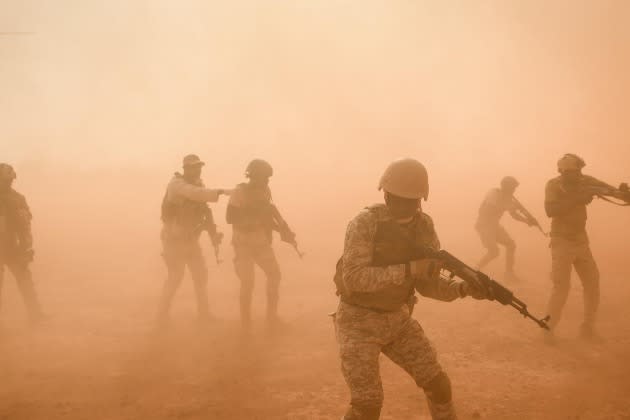
At dawn, the first rays of the sun peek over the horizon, making the Sahel a Mars red. Skinny Nigérien soldiers in surplus American Marine desert uniforms buzz around in Land Cruisers with spray-painted camouflage. The trucks are packed with shovels, sleeping pads, and ammunition. The soldiers are part of the 1st Expeditionary Force of Niger (EFON), the country’s premier anti-terrorism unit. They clamber over piles of gear to mount Russian machine guns. Others tuck backpacks stuffed with snacks, blankets, and gear between ammunition and fuel cans. One truck has a dozen tires and a spare radiator strapped to the hood.
It’s mission-launch day, and the Nigérien soldiers are accompanying French paratroopers into dangerous areas controlled by the Islamic State in the Greater Sahara (ISGS), an offshoot of the terrorist group that has taken over parts of Iraq and Syria. ISGS gained international notoriety after it ambushed and killed four Americans in October 2017. For the past five years, its members have terrorized villages and shattered communities, stealing cattle and food, while burning homes and displacing almost 30,000 people, according to the United Nations. In June, ISGS-linked fighters killed 55 people in neighboring Burkina Faso. Two days later, eight Nigérien gendarmes were killed and 33 injured in an extremist assault on Niger’s side of the border. The goal of this late-spring mission was to stop these kinds of attacks and create stability so that displaced villagers could return to their homes.
More from Rolling Stone
He Was Young, Gay, and Sold For Sex. How Jose Alfaro Escaped a Trafficking Nightmare
A Missing Musician, a Broken Family, and a Bag of Bones: Inside a 40-Year Murder Mystery
Mike, a lanky major who works for a Midwestern candy manufacturer when he isn’t halfway around the world training foreign armies, arrives with fellow members of the American Special Forces team at the EFON camp to make final checks. For the past four months, U.S. Special Forces soldiers have trained the EFON on everything from infantry tactics to exploiting intelligence gathered on targets. While they are listed as citizen soldiers on paper, most of the team from the National Guard’s 20th Special Forces Group have active-duty experience fighting in Afghanistan and recently ran an anti-ISIS mission on the Syrian border.
The Special Forces soldiers — nicknamed Green Berets because of their unique headgear — fan out among the trucks. Team Sgt. Jason, a wiry, compact police officer from Minnesota, offers the Nigérien soldiers fist bumps as he patrols down the line of trucks.
“Good luck,” he says. “You’re ready.”
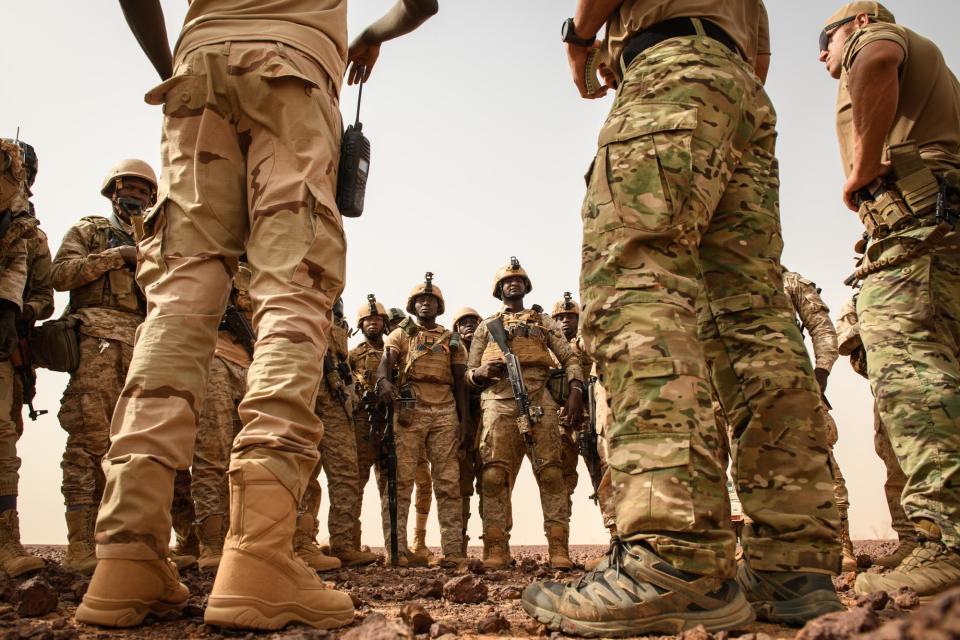
Watching them pack up for a mission is bittersweet, though. He and his teammates would jump at the chance to go with them to get feedback on the effectiveness of the mission, which to a soldier means finding the enemy and killing them. It is hard to measure effectiveness when you’re stuck on a base. When I ask the Special Forces soldiers if they’d like to go on the mission, none really answer. It’s like asking a lion if it wants to hunt.
For the Americans, 90 percent of their work is rehearsing, training, and advising. Sometimes, they will move out to a forward base in the area where the Nigériens are patrolling, but the Americans don’t follow the Nigériens to the target. Instead, advising is done via tablets and satellite phones.
That’s what Mike and Capt. Wahab, a rail-thin Nigérien officer leading the patrol, discuss quietly while another Green Beret double-checks a tablet to make sure it is functioning. It is Wahab’s link to Mike and the team back at their operations center.
“We’ll send you an update once we talk with the French,” Mike says. “Any questions or concerns?”
Wahab shakes his head no.
Nigérien cooks work their way down the convoy. The smell of exhaust hides the stink of fish as the soldiers spread sardines onto baguettes and then drizzle on the oil from the tins. Tossing the cans on the gravel, they hold on to the trucks’ roll bars with one hand and their breakfast with the other as the convoy starts to form into a long line and rolls toward the gate. Before Wahab’s truck leaves, he shakes hands with Mike and offers a salute.
“Allez,” he says, giving the order to move out. “C’est bon. Inshallah.”
Go. It’s good. God willing.
The convoy moves out, leaving the Americans behind in the dust.
Niger is not the country Americans imagine when they think about Africa.
Diori Hamani International Airport is modern, with a dinosaur skeleton in the lobby, but outside of the gates Niger becomes hot, dusty, and dangerous. There are no safari game parks or mountains to climb. There’s almost no tourism, and the landlocked country has a Level 3 travel advisory from the U.S. State Department: Reconsider travel due to crime, terrorism, and kidnapping.
The capital — Niamey (pronounced like Miami but with an N) — is congested with traffic and smog. At a stoplight, a police truck pulls up alongside with a dead man under a stray mat in the back. His arms are locked at 90-degree angles at the elbow from rigor mortis and his stomach is bloated. Outside of the capital, Niger is an endless desert. Mud compounds hug dried wadis in the villages. Trucks rumble along the lone paved road with goods piled six feet high and passengers tucked in among the cargo. Along the shoulder, children use carts pulled by donkeys to transport firewood and water jugs.
A former French colony that gained its independence in 1960, Niger is one of the poorest and least-developed countries in the world. Obvious American interests like oil and precious minerals are absent. Subsistence farming and livestock make up Niger’s economy, with 80 percent of the population living in poverty, in part because of massive deforestation and oppressive heat from climate change.
Yet it’s become an integral piece of the West Africa counterterrorism mission, part of America’s still-ongoing war on terror. Predominantly Muslim Niger is threatened by Boko Haram — responsible for kidnapping 276 schoolgirls in April 2014 — from Nigeria to the south and Libya to the north; plus, one Al Qaeda and two ISIS affiliates operate not only in Niger, but also in neighboring Algeria, Burkina Faso, and Mali.
“What we’ve seen from international terrorist dynamics over the past decade and a half are they’d like to go to places that are undergoverned, sparse, and remote, and take advantage of operating space in order to spread their ideology,” a senior State Department official tells me.
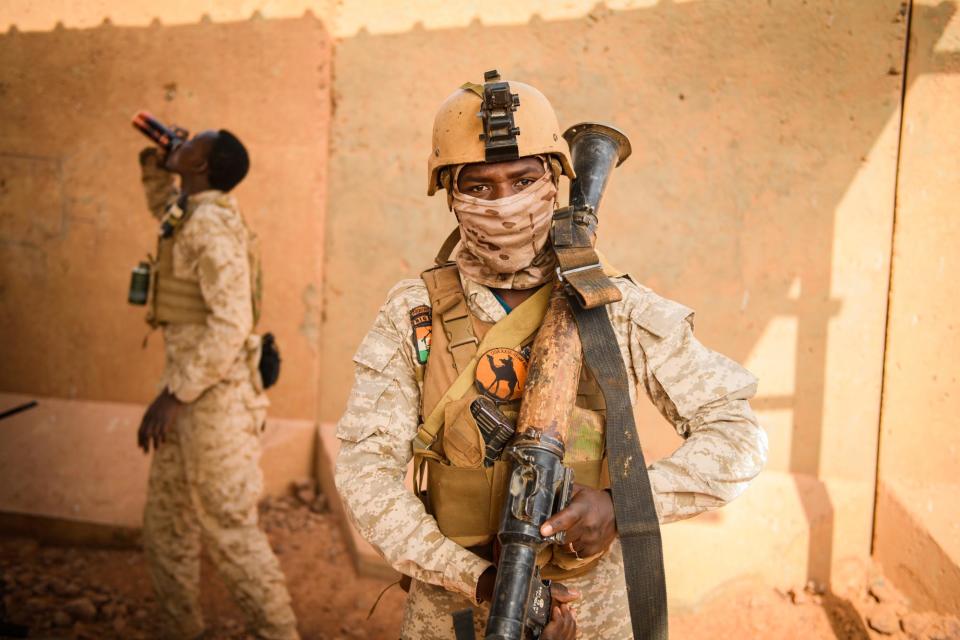
That’s where the Special Forces come in. On any given day, elite U.S. soldiers are operating in 80-plus countries. These soldiers were created in 1952 to work by, with, and through native troops, but after toppling the Taliban in 2001, Special Forces and other special-operations forces like the Navy SEALs and the Marine Raiders became a panacea for the nation’s security problems — often the first in and last out, despite being made up of about 70,000 troops out of the more than 2 million in the U.S. armed forces.
American Special Forces teams first arrived in Niger in 2014, and teams have worked heel and toe to keep a constant presence, training and advising the EFON. But success in Niger is a zero-sum game. Victory means there can be no attacks on American soil. The mission is simply to keep a lid on a potential threat, but the Special Forces teams lack the resources or political will to eliminate or drastically change some of the root causes of extremism, namely poverty. Calling the absence of something a success is the kind of logic that keeps America fighting the same war for two decades and witnessing the mission creep to remote outposts in Niger.
“To understand success, we have to have the goal, which is to disrupt VEOs [violent extremist organizations] in the region,” Jason, the Special Forces team sergeant, tells me. “With that being said, success has been marginal. With VEOs operating in certain areas across the expansive Northwest Africa region, to be truly successful more personnel and assets would be needed; and a larger buy-in between the U.S. government and host nations would need to be agreed upon too.”
Based two hours north in Ouallam, the Indiana National Guard Special Forces team is a mix of firefighters, an Ivy League student, and a small-business owner. Most have active-duty experience, but unlike their Army siblings, these are citizen soldiers who put their civilian lives on hold for six months to train Nigériens. These Special Forces soldiers are unique in the special-operations community. They are selected in part because of their people skills. They’re rapport builders, and understand how to foster a connection in order to train locals. Half soldiers, half teachers. It’s a unique skill set that hasn’t been replicated in the special-operations community, despite numerous attempts.
Niger is one of the places where that skill set is being implemented. Relying on foreign soldiers to keep the pressure on terrorist groups is a bedrock of America’s War on Terror strategy. A military representative declined to provide specific funding amounts for the mission in Niger, but the U.S. spent close to $2 billion on African operations in 2020, with $160 million going toward West African missions. I spent a week with Special Forces in Niger to get the ground truth on this nearly decades-long mission and see if it is having any meaningful impact.
Stepping on the Special Forces camp is like going back in time to Afghanistan in the early 2000s. Surrounded by Hesco barriers, large wire squares filled with dirt, the camp has an outdoor gym, a rec building with video games and old airport paperback books, and a dining facility that serves pork adobe, fresh guacamole, and curry beef instead of the normal bland Army menu. For the team from the Midwest, with palates more accustomed to American cuisine, pizza night with imported sauce and pepperoni is essential.
When we arrive, Nick, an engineer-sergeant with all-American looks and the only French speaker, shows us around. It’s noon and the temperature is well over 100 degrees. Most of the team is either working in the air conditioning or resting. It is too hot to do anything outside, expect apparently work on your tan. The tour takes us to the top of the operations center, which offers a panoramic view of the scrubby desert outside of the base. Drew, a barrel-chested firefighter from Illinois, meets us on the roof, where the team keeps suntan lotion and Army cots. Startled by reporters on the roof, he looks at the metal staircase and then back at the cots and shrugs. He is committed now. Soon, Sam, an engineer-sergeant who owns an environmental-remediation company, joins him. Peeling off their shirts, they lay out on the cots and slather suntan lotion on their chests and arms.
Later, Jarryd, a lanky medic from New Orleans wearing a lobster-themed Hawaiian shirt, stops to talk to us about a medical clinic he and his fellow medic Josh — an MMA fighter from Minnesota — organized with some local doctors. The clinic has treated hundreds of local villagers, some who haven’t seen a doctor in years.
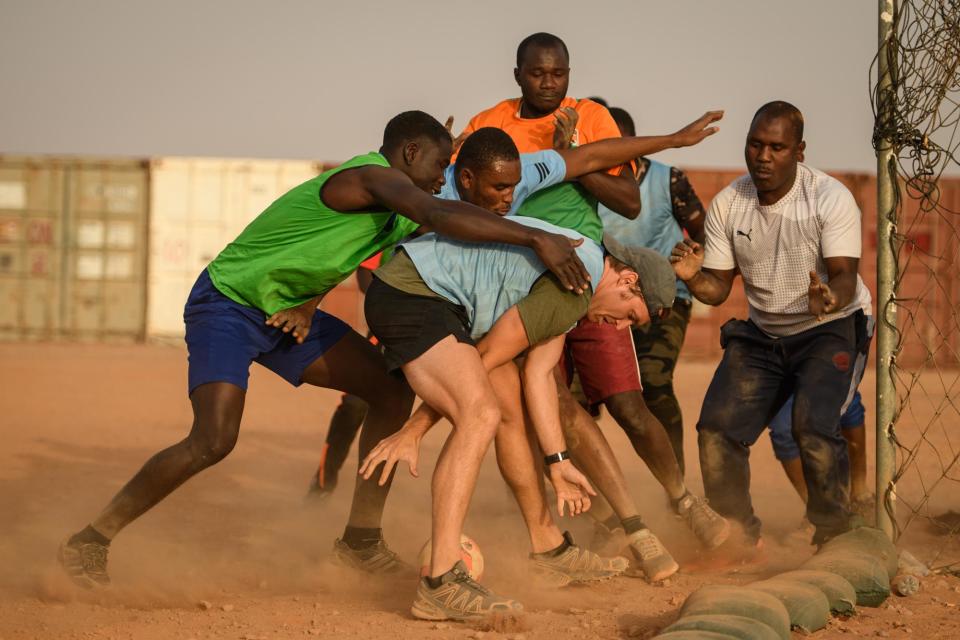
Don’t let the lobster shirts, tanning sessions, or medical clinics fool you. This is a dangerous mission. When the first teams arrived in Niger, in 2014, they went on missions with the Nigériens, but the focus that the Indiana team has inherited changed in 2017, when four members of the Fort Bragg-based 3rd Special Forces Group were killed in a deadly ambush in Tongo Tongo, a village near the Mali border. After raiding the ISIS camp, the 3rd Special Forces team and its Nigérien counterparts were attacked by more than 100 fighters. Before the ambush, Americans followed the EFON into the field. Now, Americans only move out to a forward base; all advising is done remotely. The safety measure allows the Green Berets some oversight but keeps them far from the action, making the whole mission feel “too risk-averse,” as one Green Beret complains to me.
Adam Grissom, a senior political scientist for the Rand Corp. who focuses on counterterrorism operations in Africa and the Middle East, says that for years there was a mismatch between what policymakers wanted special-operations forces to accomplish and the level of risk the nation was prepared to accept.
“After the Tongo Tongo ambush, that risk-reward relationship shifted, but now policymakers still expect special-operations forces to accomplish quite a bit while accepting essentially zero risk,” Grissom says. “That’s hard to do in real-world African conditions.”
But this divide between risk-averse policymakers and soldiers who carry out their orders is determining the future of the region, and may be influencing U.S. foreign policy. There is no appetite to send Americans en masse into harm’s way. Instead, Special Forces teams provide a small footprint, to create and advise a larger, native force capable of taking the fight to the enemy. The Niger mission arguably is a glimpse into the new American way of war.
“The EFON is extraordinary when considering the economic and geographic challenges Niger faces,” Rear Adm. Jamie Sands, commander of Special Operations Command Africa (SOCAFRICA), tells Rolling Stone. “Despite those challenges, the EFON and Nigérien leadership are extremely professional, focused, and committed to defending their nation. They are among SOCAFRICA’s best partners in our recent history.”
This is a sentiment echoed by the team to me soon after I arrive in Niger. They assure me the EFON is skilled and motivated, and that its mission could be successful.
“You can still mitigate risk while being aggressive,” Mike tells me when I ask him if the rules of engagement are too risk-adverse. “It’s a model. We’re not leading the fight. It is 100 percent their fight. It is the most bang for the buck.”
The team did get a mission approved that allowed them to leave the base to chase a specific target, Jason says. He declines to provide details on who the target was or if the mission occurred, but acknowledges the reins were loosened for one high-value target.
America’s aversion to casualties all but assures that Jason’s team and future units won’t be near the action, which puts even more importance on getting the training and rehearsals right. No small task. Having covered the military for more than 20 years, I’ve seen a lot of partner forces. For the most part, they are poorly equipped and lack discipline and motivation when the Americans aren’t around to give directions.
The first partner force I saw was in August 2003, in Baghdad. The Americans stood up a civil-defense force recruited to provide security in the Al Rasheed district. On the first day, the recruits arrived dressed like some Russian-mafia muscle — Yankees hats and track suits. The paratroopers lined up the recruits — mostly older men with beer bellies, or scrawny teens — and cajoled the Iraqis through a battery of jumping jacks, push-ups, and crunches. The scene was pathetic. Most quit soon after. When I returned a few months later, no one talked about the civil-defense corps.
That first impression of the Iraqis left me with two lessons. First, training a local force is a good briefing point for generals, but way harder to execute and for required units like Special Forces to be effective. Second, motivation is essential. If the American soldiers want it more than the locals, the partner force is doomed.
I didn’t expect any different from the EFON, despite the rave reviews.
It’s Monday morning and Green Berets George, Drew, Sam, and Jarryd head up to the plateau to start the training day. It’s less than a week before the EFON unit departs with French paratroopers and two weeks before the Green Berets will take another EFON unit on a 10-day operation.
The team takes a 10-minute commute over dirt roads. It passes a group of kids sitting on a cart piled high with firewood and pulled by a donkey. A group of women in colorful green-and-red robes shuffles along the shoulder toward the market in Ouallam, carrying containers on their heads or balanced on sticks across their backs. They shield their eyes from the dust as the trucks pass. The levels of poverty here is what makes the area such a wellspring for ISIS and Al Qaeda recruits.
The EFON is based on a high plateau overlooking the Tillabéri area of northwest Niger — about 60 miles from the Mali border. The empty landscape of baked earth stretches from the top of the plateau to the edge of the horizon, shimmering from the heat. In between, wispy brown bushes and dust kicked up by truck tires swirls around a crystal-clear blue sky. The soldiers live in a camp encircled by 10-foot-tall concrete barriers. Shipping containers in the middle are converted into a base kitchen. A playing field has two handball goals on either end. The Special Forces soldiers join the Nigériens in games once a week. It’s a mix of rugby, soccer, and basketball. Teams score one point by throwing the ball into the goal. Defenders can’t tackle, but they can stop an offensive player’s movement by grappling him from behind. The Nigérien soldiers use the game as physical training. The Americans use it to build rapport.
“It shows we’re not too good to relate,” Jason says. “It’s one way to span that cultural gap.”
But on Monday it is time to train.
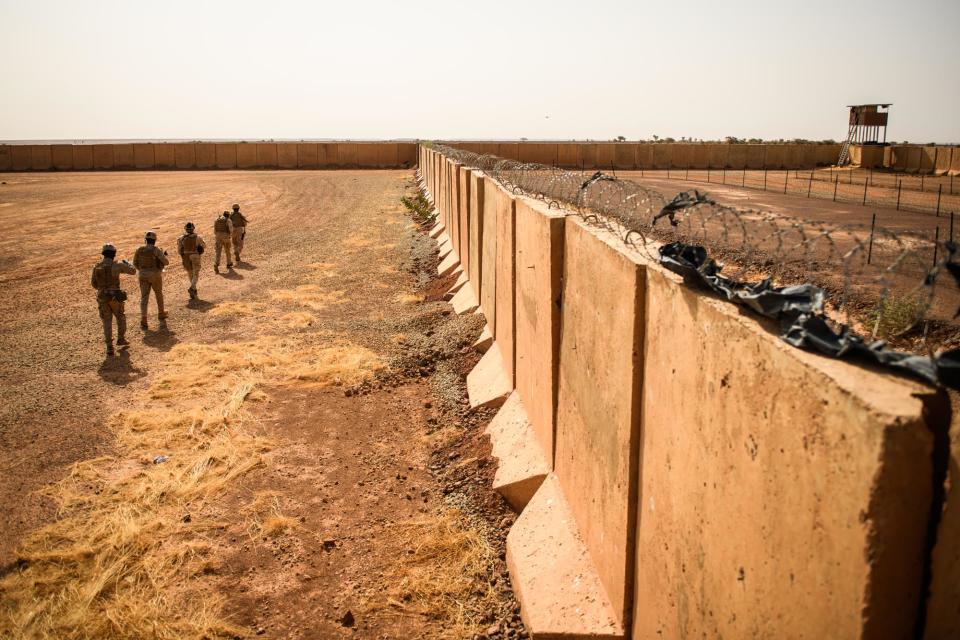
Drew, the suntanning weapons sergeant who has been deployed to Afghanistan a half-dozen times, organizes the team in a gravel parking lot. He wears the team’s desert camouflage trucker cap with a scorpion patch and team motto — “Non vi sed arte,” meaning “Not by strength by guile” — embroidered on the side. With dark Oakley sunglasses covering his eyes and a pistol on his belt, he climbs into the lead truck headed for the EFON camp.
“Motivation is key,” Drew tells me. “Unlike past partner forces, these guys want to train and fight.”
We’ll see, I think. My mind flashes back to Kandahar in 2010, and the time I watched a Special Forces team go door to door to roust an Afghan unit from the barracks to train. By the time they got everyone out of their bunks and ready, the training period was over.
The Green Berets arrive and park near a group of shipping containers. Climbing out of the truck, I spot a covered area. Sitting in a horseshoe pattern are 20 Nigérien soldiers gathered around an easel going over how to assault a target. AK-47s are draped over their chests. A few have Russian PKM machine guns or RPGs. Their uniforms are clean. A sergeant — another difference, as many foreign armies rely on officers to do the same jobs as sergeants in the American military — is giving the brief, and everyone appears as engaged as any American soldier getting the same brief at Fort Bragg.
Sitting in a nearby truck watching is Lt. Siedi, a boyish 29-year-old commander of the unit. He wears the same trucker cap and sunglasses as Drew. Unlike the Americans, he is slight and lean, with a baby face. He moves and speaks slowly, projecting a calm demeanor and the appearance of being in complete command of his men and situation. A native of Niamey, he attended military school and joined the officer corps after graduation. Serving with the EFON was a no-brainer, he says, because he wanted to serve with the best.
“I could be sitting in a cool office,” he tells me later. “But I am out here to defend my country.”
I ask him through a translator who he is fighting. Are they terrorists or just criminals? Siedi smiles. Both. When someone steals 100 cattle, it is difficult to figure out if it was a crime or someone financing jihad.
“They hide behind the fact they do jihad,” Siedi says, shaking his head. “Most of them are just bad guys looting the people.”
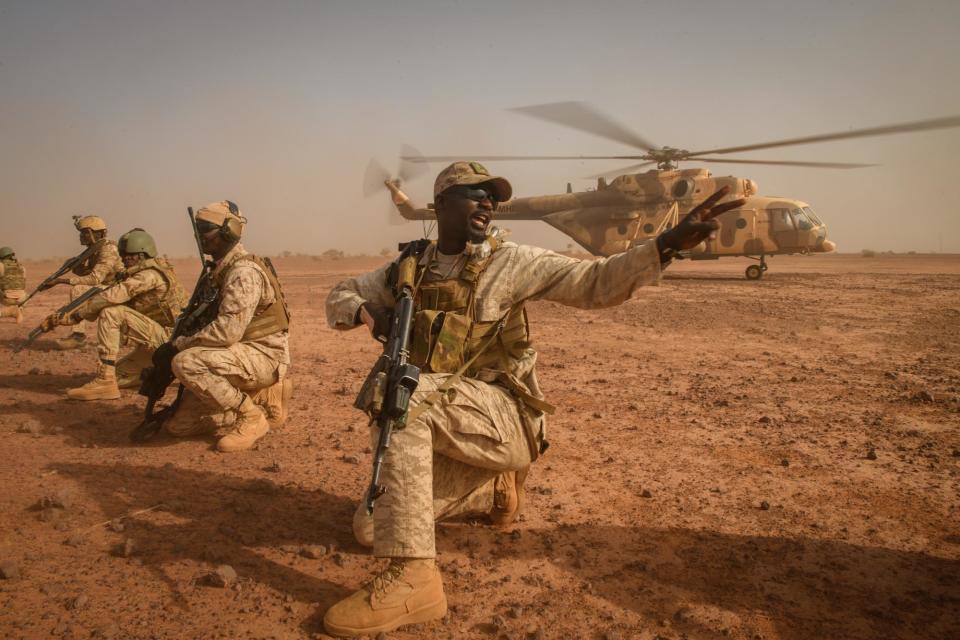
It’s Siedi’s unit to command, but the work is done by his sergeants like Bashir, a lanky 40-year-old squad leader with a goatee that has a few rogue gray strands. Bashir joined the army almost two decades ago. He first tells me it was because he wanted to serve his country, but after a little prodding, he admits it was because his school friends all went down to the recruiting office together. It was also a way to make a living, he says through a smile.
One of his first missions was along the border with Nigeria. He was stationed at an austere base when Boko Haram attacked from across the border. During the firefight, one of Bashir’s friends was killed and his army job became personal. He sought out the selection process for the EFON. His friend’s death motivated him to earn a spot. Bashir makes it clear that Niger is at war, a fact that is never far from his mind. That’s why, when the Americans arrive, his men are already focused on the day’s event because, the father of three knows, if he does his job there could be a future in Niger.
“My wish is for us to have security,” Bashir tells me, looking over my shoulder back toward Niamey — and his family. “If there is no security, there is no economy. There is nothing.”
With the briefing done, the Nigériens finish off the last of their energy drinks and get in formation. They walk in a line to the corner of the base and set up a security perimeter. Bashir, Siedi, and the other leaders recon the target — a pair of shipping containers converted into a kitchen — as the Green Berets spread out to watch the action.
Drew makes notes in a green notebook as the Nigériens set up support-by-fire positions with their machine guns, to cover the assault force moving toward the target. The attack starts with Nigérien soldiers making gunfire noises like kids playing in a backyard. They move in a line quickly toward the containers, guns up. It takes only a few minutes to overwhelm the cooks, who are busy making the afternoon meal. A few play dead, taking a break by dying, while others surrender and get searched for intelligence. Bashir’s men leave the dead on the ground, their arms and legs crossed, their T-shirts pulled over their faces.
“That looked really good,” Drew says. “You did it to the book standard.”
“If we do things in training,” Jarryd says after watching the EFON train the following day, “we are going to do things in habit. We’ve talked about a lot of things that we can correct — we’re always going to find things that we can do better.”
Monday is level-one stuff. The next day, Drew and his team run through more raid training in the morning, before bringing Siedi’s men over to the Special Forces compound for night training and to eat dinner.
“It’s taco Tuesday,” Drew tells them after the morning session. “You’re eating with us.”
The goal of the night session is to simulate how they’d get intelligence in the field. The team prepares a target package for a suspected roadside-bomb maker with aerial photographs and spotty intelligence reports for a site just outside of the gate. Drew sets up the role players in a dusty field where bricks and building material for the base are stored. Hidden on the role players is a SIM card, a map, and a pistol.
When the EFON arrives at the Special Forces camp, Drew and his team pull Siedi, Bashir, and the other leaders into a briefing room and provide them the target package.
“We’re going to drop a pin on the target,” Drew says. “Two to three buildings. Two to three people.”
The Nigériens split into two planning teams. Bashir and the other squad leaders study the intelligence. Using a sand table, they brief Siedi using toy cars to simulate trucks and matchboxes as buildings. Taking elements from both plans, Siedi comes up with a course of action and then forms up his men outside of the gate. Before they launch the attack, Drew stops them.
“We’re trying to make sure the lowest man knows the big scheme of maneuver,” Drew says. “Did anyone not understand the plan?”
No one raises their hand.
“Très bien,” Drew says. “It’s your show. We’ll stand back and see how you sort it.”
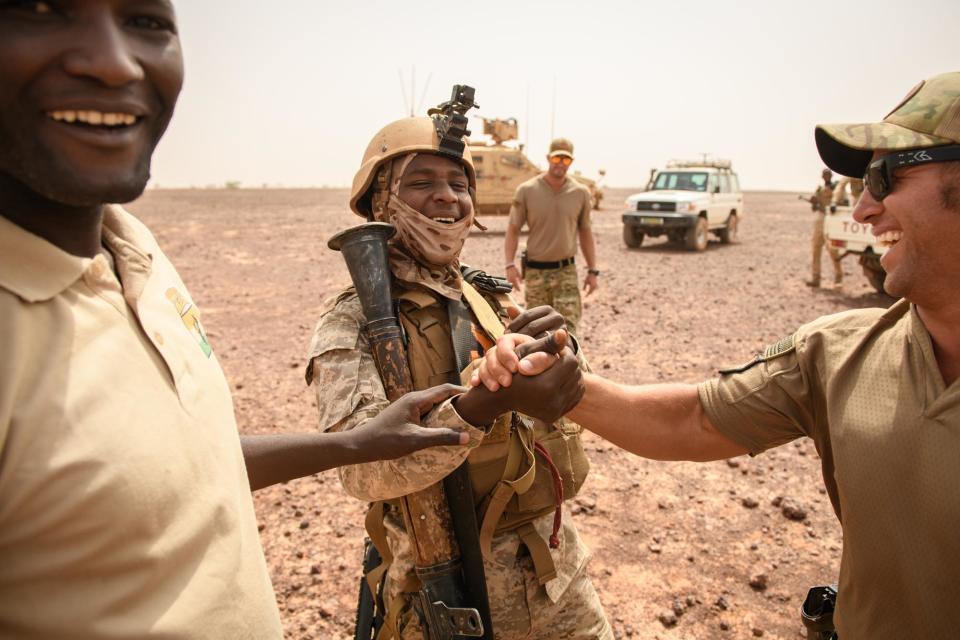
Siedi’s men set up behind a sand berm and then flank the target from the right, using the brick piles as cover. The attack during daylight is successful, and the Nigériens enjoy chicken-fajita tacos and bean burritos before trying it again in the dark.
It is 8 p.m. and impossible to see anything without night-vision goggles. The Nigérien soldiers’ boots crunch along the gravel as they get into position behind the sand berm. Siedi sets up security positions and then leads them toward the target. The only sound is the clattering of their gear. The Nigérien soldiers are about 20 yards from the target when one of the role players — an American soldier working at the camp — spots them and turns on his flashlight.
The Nigériens rush the target — raising their rifles and yelling out commands to surrender. Taking the role players prisoner, they beat feet back behind the berm. Shining white lights in their faces, the EFON questions the role players, but fail to find any incriminating evidence. After a few minutes, Drew calls the exercise and gathers up the troops. They have failed, and I can tell Drew and the others are disappointed.
“We’re going to be blunt,” he says. “You missed some SSE.”
SSE — sensitive site exploitation — or the gun, SIM card, and map hidden on the target.
“This is my angry voice,” Drew says. “I want you to know. Once you clear the objective, you’re looking for more intel. It could be a map, guns, or a computer. I was not impressed by the way you searched the objective.”
Drew holds up the SIM card in a small plastic bag. He then holds up a bag hidden in the bricks.
“What’s this? It’s a SIM card,” Drew says. “It was in someone’s pocket. What’s in the bag? It’s a map. This is the stuff that will keep them detained.”
Once the EFON leaves the gates, there will be no one there to mentor. Tactically, the EFON is solid. But thoroughly collecting intelligence takes a unit from competent to lethal. Take the map and SIM card: Had this been a real mission, it likely had the phone numbers of other members of the terrorist or bandit cell. That kind of data is gold because America has made a living tracking terrorists by their phones. I’ve been on countless missions where the unit didn’t know the target’s name, only the code name for the phone.
By now, it is close to 10 p.m. The soldiers — both American and Nigérien — have been training since the morning. But no one wants to quit. Siedi and his men want one more try. The next time, they practically strip the prisoners to find the SIM card and map.
But the real game changer comes at the end of the week, when a pair of helicopters with a Niger flag painted on the bottom soar over the plateau. Since the team arrived in late 2021, they’ve been trying to pry loose helicopter support from the Niger government. In March, that support finally arrived.
Niger’s air force has a few combat aircraft in its inventory, including three ex-French army air corps Gazelle helicopters. The Gazelle takes the lead when the target — a white Land Cruiser — is spotted, and races to cut it off. Coming to a hover, it convinces the driver to stop by training its 30 mm cannon on the truck. The MI-171 comes next. It circles the plateau before landing nearby in a cloud of dust. From that dust, a line of Nigérien soldiers dash out and surround the Land Cruiser. Soldiers capture the two American engineers posing as bad guys while others search the truck.
The team started this training months ago using trucks. That was easy compared with getting on a helicopter and intercepting a vehicle. In real life, it is a lot of noise and dust. The rotor makes it impossible to hear, and the dust blinds everyone. The first runs are slow, tentative — the Nigérien air force getting comfortable with the mission. The next day, the Aerospatiale Gazelle spots the target and bears down. As the assault force lands, Jason checks his watch, and then checks it again when they have the driver in custody.
“Seven minutes,” Jason says, smiling. “That was great. They cut their time in half from yesterday.”
Planners in Africa talk about the tyranny of distance on the continent. Africa doesn’t get its due on maps. It is big, and getting around — because of a lack of roads and infrastructure — is hard. Jason says the team might get a report of terrorist activity in a village, but when they check the map, it’s a 10-hour drive.
That is if everything goes right. On one 36-hour convoy, the EFON had to change 37 flat tires. A helicopter solves both problems and allows the EFON to cover distances the enemy cannot. The helicopter gives the EFON wings — and saves on tires.
Bedu, one of Siedi’s deputies, says the U.S. training is making the EFON a better fighting force. Bedu wanted to be a lawyer before he joined the army. “I wanted to protect my country,” he says, as his men wait for their turn in the helicopter.
Now, 14 years later, he has a family and a two-year-old daughter in Niamey — another reason, he says, to fight. He thinks of her when he is on patrol. She is why he picks up a gun for a living. Leaving them every two months is difficult, but a reality in Niger as the country has been at war for as long as he can remember, and the skills he is learning from Drew and the other trainers will keep him alive.
“We are stronger than the bandits,” he says. “They give us the tools to help us be successful. When we are united, we’re strong.”
But I still couldn’t answer one nagging question: So what?
For the past few days, I have witnessed the EFON’s motivation and training. It has lived up to the team’s hype. But how is this small force — even with helicopters — going to bend the arc of Niger toward security and prosperity? It is hard to see how a dozen Special Forces soldiers and roughly 120 Nigérien commandos covering 200,000 square miles make a difference against an estimated 2,500 fighters aligned with either ISIS or Al Qaeda. Grissom, the RAND analyst, says it depends on how you define “difference.”
“It’s about limited investments aimed at limited reductions in risk to the United States,” he says. “We’re never going to ‘fix’ any of these societies because they aren’t ‘broken,’ just different. Best case, you’re going to prevent something bad from happening somewhere down the road. But that’s very difficult to prove — the attack that didn’t happen. So that raises the question of how you judge whether you’re accomplishing anything or not. As a strategist, I can say if you don’t do these things, the problem does get worse.”
Americans make several mistakes when they look at Africa through a military lens. More troops and holding ground are not essential to victory.
“While the EFON is clearly not big enough to control much more than their own neighborhood,” Grissom says, “I’d argue they’re an instrument that’s appropriate to how warfare works in that part of the world.”
Unlike in Iraq and Afghanistan, where America sold freedom and nation building, the burden of victory falls on African nations to solve governance and economic issues, says Adm. Sands, commander of special operations in Africa. “We cannot expect them to do this alone, but the will of African nations, not U.S. military activity, is the key predictor of long-term success,” he says.
I arrived in Niger looking for answers only to run into the ground truth — the complex and confounding reality of a combat zone. On the micro-level, things were progressing. Years of constant Special Forces deployments appeared to have paid dividends. If the government of Niger leans in with helicopters, the EFON could theoretically keep the pressure on the terrorist groups operating within the Sahel.
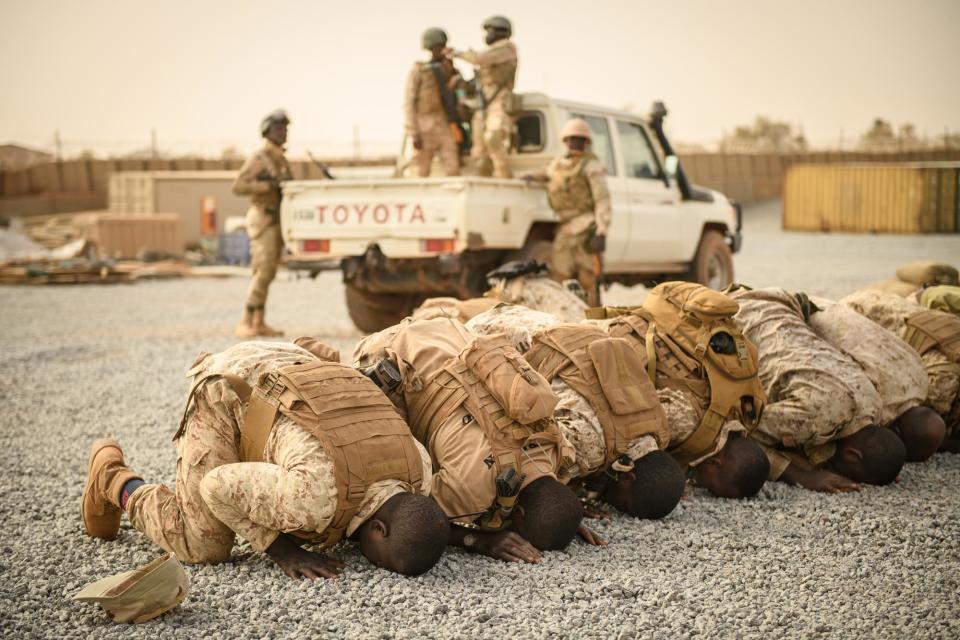
But history tells us these advising missions are difficult and often take years to pay off. Colombia’s victory over the FARC can be traced to a decade or more of advising missions by Special Forces. American-trained Iraqi counterterrorism forces helped take Mosul back from ISIS. American training deployments are paying off in Ukraine, where superior weapons and tactics and motivation are overcoming Russian numerical superiority. The only concrete measure of success is eventually working yourself out of a job. Mission accomplished is when Special Forces are no longer deploying there.
But that’s not happening anytime soon in Niger.
“For the time being, we will have a steady presence here,” Jason tells me. “Working ourselves out of a job isn’t a concern.” Special Forces will have plenty to do well into the future. And he’s proud of the work. It was a partnership, he says, with a common goal of making the EFON an elite unit. “They worked with us,” he says, “not for us.”
Yet, at the end of the day, most of the risk is assumed by the EFON, a fact not lost on anyone, especially Bashir, who has spent his whole adult life taking a gun to work in order to feed his family. Americans come and go and the U.S. government’s ever-shifting ideas on what it wants Niger to be will change with each administration, but for men like Bashir, the stakes could not be higher. He isn’t training to fight for democracy or to keep enemies off his nation’s lands. He is fighting for something more tangible: survival.
“They don’t know if I will come home,” he tells me about his family waiting in Niamey. “Or if they saw me for the last time.”
Best of Rolling Stone

